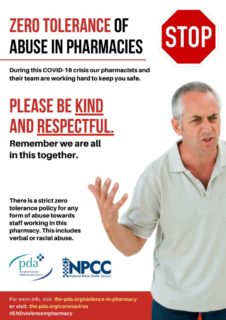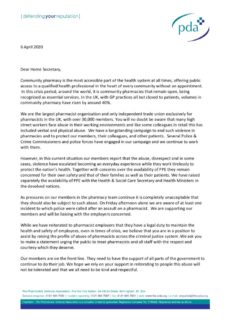Employer action needed
Sadly, aggressive patient behaviour was already experienced before the COVID-19 crisis began and the zero tolerance of abuse measure is part of a long-running campaign by the PDA to end violence in pharmacy. However, given the increase in incidents, the PDA is now calling on pharmacy employers to implement the Violence in Pharmacy policy and let patients know that this is their position.
Employers have a strict legal duty to protect the health and safety of their staff at work, and while the blame for any incident sits firmly with the abuser/assailant, employers nevertheless need to do all they can to prioritise the safety of their employees by seeking to prevent incidents as well as acting appropriately if they do still occur.
Law enforcement
In addition to calling on employers to act, the PDA has also written to Home Secretary Priti Patel (see below) calling for government support to raise the issue and take whatever measures are necessary to protect pharmacists, their teams and other patients from abuse and assault. The PDA believe that more awareness and support from the police and firm penalties in the courts for those who assault pharmacists is essential.
Previously, the PDA lobbied to ensure that community pharmacists are in the scope of the Assaults on Emergency Workers (Offences) Act 2018, which makes tougher penalties possible.
The PDA has already successfully engaged a number of police forces (read more) in supporting their campaign to end violence in pharmacies, including working with Police & Crime Commissioners to recognise and take action on the situation in community pharmacy.
Posters
The PDA has today released a poster emphasising zero tolerance of abuse in pharmacies which it encourages all members to print and display in their pharmacy. The awareness of this policy is key if patient behaviour is to be influenced.
Download the PDA poster here to display in your pharmacy:
The PDA recognise that the National Pharmacy Association issued a similar poster to their members in January 2019, which we applaud. However, as many pharmacists are working for employers who are not members of NPA, our poster can be used in any pharmacy. We trust that all employers will not only endorse the posters being displayed but also strictly enforce the policy of ZERO TOLERANCE of abuse across the entire sector.
Download the content of the letter to Priti Patel here

